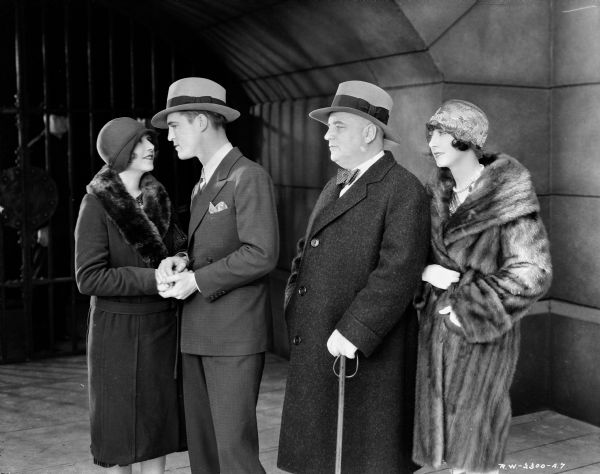In 1927, Elaine Sterne Carrington, J.C. Nugent, Elliott Nugent, and John Wray collaborated in the writing of a stage play titled Nightstick. The play was only a mild success, opening at the Selwyn Theatre, now known as the Todd Haimes Theatre on W. 42nd St in New York City. It ran for 84 performances before closing down two months later. Shortly afterwards, it was optioned for the movies, where it found distribution by United Artists, then an alternative to the studio system, founded by Charlie Chaplin, D.W. Griffith, Mary Pickford, and Douglas Fairbanks Sr. This film version met with greater success than the stage play and became one of the few movies to be recognized at the second Academy Awards.
At this time, talking films were just finding their legs and gaining momentum, and there were certain expectations to be met to prove to audiences at the time that it was worth the extra effort to make a film with an audio track. One of these prerequisites was musical numbers, as seen in the Oscar winner that year, The Broadway Melody. This trope can be found in Alibi, also, with set pieces taking place at a nightclub with dancers and singers on stage. These numbers halt the plot of the movie to allow the audience to bask in the novelty of seeing and hearing the performers. While this may seem detrimental to the pacing of the film, it would have been a novelty at the time and has to be viewed with that in mind.
The story is about as bare-bones as it comes. The daughter of a police sergeant, Joan Manning (Eleanor Griffith), secretly marries Chick Williams (Chester Morris), a gang leader who misleads her into believing he is living an honest life. The two of them attend the theater and, during the intermission, Chick sneaks away and commits a robbery in which a policeman is shot and killed. Chick is immediately a suspect in the robbery and murder, but his wife and his theater tickets provide him with a near airtight alibi. The only weakness in that alibi is the few minutes he was absent during the intermission.
To close that gap, he finds a patsy within his gang whom the police will believe, claiming he and Chick were on the phone during that gap in time. Unbeknownst to Chick, though, is that the “patsy” is an undercover cop, Danny McGann (Regis Toomey), assigned to infiltrate the gang. When Chick finds out, a shootout occurs, and the situation turns desperate for the murderer, who shows his true stripes when faced with the real possibility of being gunned down rather than being brought in and jailed.
This is a very straightforward crime drama that really betrays its age. While it fares better than many of its contemporaries, it still feels like an early talking picture and hasn’t been preserved as well as many other pictures from this time, including The Broadway Melody. It tries at one point to mislead us into believing that Chick may not be responsible for the robbery and murder, but at no point is this misdirection believable. It even plays up this angle with a police interrogation that is so far over the line as to fall into ludicrous territory. This confession they try to force out of one of the crooks is so bad that even the worst attorney in the world could get it thrown out of court.
Alibi received good reviews at the time, praising its credibility and action set-pieces, but the dialogue is hokey, and the overall tone is stiff and uninspiring. Very little of this film holds up anymore, and the only really shocking moment comes late in the film when Chick attempts to jump from one rooftop to the next. The effect is obvious, but the moment is still enough to get you to sit up in your seat. It reminded me of a similar moment with Humphrey Bogart in Dead End.
For a movie from the 1920s, this is not too bad; I have certainly seen films from that period, and later, that have aged far worse. But watching it now, it does shows its age, and it is harder to find things to enjoy in this melodramatic production. There are no real surprises in this plot, and there isn’t really any good acting to latch onto either. This makes for a rather tame production that will really only appeal to those who are looking to watch every Oscar-nominated film like I am. It’s available for free on YouTube or embedded into the Wikipedia page for anyone who does want to check it out. At around 90 minutes, it won’t overstay its welcome.
There was a lot of potential in this film, but it just doesn’t live up to it. The writing is bland and predictable, the staging is dull, and the acting is not up to par, including Chester Morris, who was nominated for an Oscar for this. The worst offense, though, is the staging of Danny McGann’s death. The filmmakers allow this scene to play out for so long it borders on parody. This is a rough film that just plainly doesn’t hold up after all this time.
Academy Award Nominations:
Outstanding Picture: Roland West
Best Actor: Chester Morris
Best Art Direction: William Cameron Menzies
____________________________________________________
Release Date: April 20, 1929
Running Time: 90 Minutes
Not Rated
Starring: Chester Morris, Eleanore Griffith, and Mae Busch
Directed By: Roland West








Comments
Post a Comment